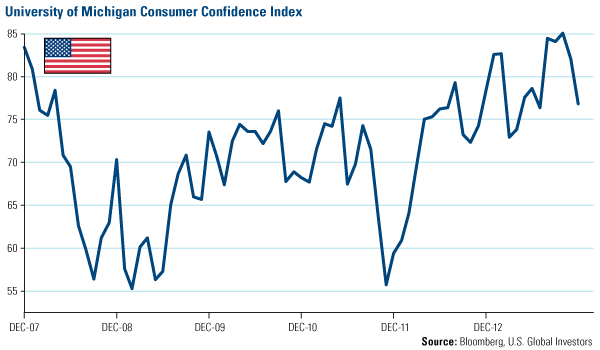The Economy and Bond Market Radar (September 16, 2013)
Treasury yields fell modestly for the week with the 10-year Treasury bond back below 2.90 percent after briefly touching the 3 percent level in the middle of last week. Economic data was mixed and did not move the market much. The focus remains on the FOMC meeting next week and the speculation on the size of the expected quantitative easing (QE) tapering. The key issue for the Fed is to walk that fine line of removing stimulus while the economy is still muddling through. The chart below is a great example. The University of Michigan Consumer Confidence Sentiment Index has fallen sharply over the past two months, highlighting the fact that the economy doesn’t “feel” like it is accelerating. The risk is that the Fed removes stimulus too early and the economy falls back into recession. The flip side of that coin is if the Fed waits too long to make a decision and inflation begins to pickup. Then it would be too late and there would be an inflation problem to deal with.
Strengths
- Economic data out of China continues to impress with industrial production rising 10.4 percent in August, while fixed asset investment grew 20.3 percent.
- Japan is also in the middle of a rebound with second quarter GDP being revised higher to 3.8 percent, after growing 4.1 percent in the first quarter. This is a positive change in direction for one of the largest economies in the world.
- Weekly initial jobless claims fell to 292,000, well below the recent trend. Some technical issues in California and Nevada were largely responsible for the big drop, but overall the trend remains intact and positive.
Weaknesses
- August retail sales disappointed rising 0.2 percent, well below the expected reading of 0.5 percent.
- Consumer confidence indicators have been flat to down recently as consumers appear less optimistic about the future. This was likely translated into the weak retail sales numbers.
- Mortgage applications fell 13.5 percent last week as higher mortgage rates are taking their toll.
Opportunity
- Despite recent conflicting commentary, the Fed continues to remain committed to an overall accommodative policy, unlikely to raise interest rates in 2013 or 2014.
- Key global central bankers remain in easing mode such as the European Central Bank, Bank of England and the Bank of Japan.
- The recent selloff in bonds is likely an opportunity as financial markets tend to overreact in the short term.
Threat
- Inflation in some corners of the globe is getting the attention of policy makers and may be an early indicator for the rest of the world.
- Trade and/or currency “wars” cannot be ruled out which may cause unintended consequences and volatility in the financial markets.
- The recent bond market selloff may be a “shot across the bow” as the markets reassess the changing macro dynamics.















